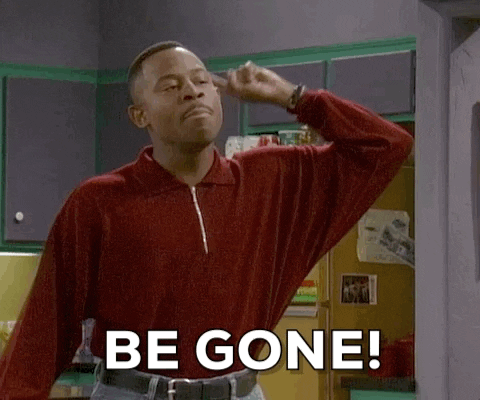The Last of Us HBO Series
- Thread starter X-SOLDIER
- Start date
looneymoon
they/them
- AKA
- Rishi
that dragon threw me off. then i realized it was part of the HBO bumper.
Lulcielid
Eyes of the Lord
- AKA
- Lulcy
Lulcielid
Eyes of the Lord
- AKA
- Lulcy
Lulcielid
Eyes of the Lord
- AKA
- Lulcy
Erotic Materia
[CONFUSED SCREAMING]
Oh man, I think that's a perfect role for him.
MoLe_BlAdE
Lv. 25 Adventurer
I've never played the games. Heard great things but just never got around to it. I'd really really like to give this a watch. Am I going to get lost?
looneymoon
they/them
- AKA
- Rishi
I've never played the games. Heard great things but just never got around to it. I'd really really like to give this a watch. Am I going to get lost?
I haven't watched this, but the plot of the game isn't particularly complicated, so probably not?
Lulcielid
Eyes of the Lord
- AKA
- Lulcy
Rankles
Pro Adventurer
Thought it was a very good first episode tbh. Characters seem very close to their game counterparts, even if wrong looking Ellie is still a bit distracting.  Glad they kept the opening scene pretty much the same, also liked the way they tied into it later in the episode.
Glad they kept the opening scene pretty much the same, also liked the way they tied into it later in the episode.
I’ve seen some criticism of them changing the way the infection is spread, but it’s really not a big deal for me and just seems like petty nitpicking.
 Glad they kept the opening scene pretty much the same, also liked the way they tied into it later in the episode.
Glad they kept the opening scene pretty much the same, also liked the way they tied into it later in the episode.I’ve seen some criticism of them changing the way the infection is spread, but it’s really not a big deal for me and just seems like petty nitpicking.
Erotic Materia
[CONFUSED SCREAMING]
Wait, what changed? It seemed the same to me.I’ve seen some criticism of them changing the way the infection is spread
looneymoon
they/them
- AKA
- Rishi
I think they have roots coming out of their mouths instead of spores?
Erotic Materia
[CONFUSED SCREAMING]
Looks like you're right. At first I was resistant to the idea, but there are some good points being made, I think:

Also this (@8:30):

Also this (@8:30):
Lulcielid
Eyes of the Lord
- AKA
- Lulcy
Clement Rage
Pro Adventurer
Eh, zombie apocalypses run on magic anyway, it's why they always have to skip forward from outbreak day to 'later time when outbreak has passed', because no one can think of a way to make that actually make sense.
I doubt they are actually going to do the hivemind thing, makes it too difficult if the first time you shiv part of the nest all the others automatically know. Being quiet doesn't help hide you from echolocation to begin with, either you go with the premise or you don't.
Seems solid enough, but honestly, this part is pretty easy to adapt. We'll see if they can keep it up.
I doubt they are actually going to do the hivemind thing, makes it too difficult if the first time you shiv part of the nest all the others automatically know. Being quiet doesn't help hide you from echolocation to begin with, either you go with the premise or you don't.
Seems solid enough, but honestly, this part is pretty easy to adapt. We'll see if they can keep it up.
Ite
Save your valediction (she/her)
- AKA
- Ite
Not Final Fantasy: The Spirits Within?

D
Deleted member 13557
Guest
Yeah I liked this a lot. Did one specific major moment exceptionally and the new stuff (especially that opening, god damn!) felt natural and serviced the story.
Erotic Materia
[CONFUSED SCREAMING]
Not Final Fantasy: The Spirits Within?

Lulcielid
Eyes of the Lord
- AKA
- Lulcy
The Last of Us co-creator, Bruce Straley, says he was left off the HBO credits and says the games industry should unionize to protect creators.
Bruce Straley, co-director and co-creator of The Last of Us — the original, 2013 PlayStation 3 game — is not mentioned in the credits for the new HBO TV adaptation, which aired its first episode this week. His co-director Neil Druckmann, however, who is actively involved in the show as its executive producer and co-creator (with TV showrunner Craig Mazin), also gets a mention as the writer of the original. “Based on the PlayStation Studios video game created by Naughty Dog and written by Neil Druckmann,” the on-screen credit reads.
Straley, it seems, isn’t too happy about this outcome. Although his primary responsibility on the game was gameplay while Druckmann’s was script and story, the pair have repeatedly said that they created the world and the storyline of The Last of Us together. But, when asked about his lack of credit by the Los Angeles Times, Straley chose his words — and his targets — carefully.
“It’s an argument for unionization that someone who was part of the co-creation of that world and those characters isn’t getting a credit or a nickel for the work they put into it,” Straley said. “Maybe we need unions in the video game industry to be able to protect creators.”
It’s perhaps an unlikely comment from someone who used to be a senior developer at Naughty Dog, a studio with an unhealthy reputation for crunch. But Straley has had plenty of time to reflect on that. Straley left Naughty Dog in 2017 after 18 years with the studio, following an apparently unhappy experience making Uncharted 4. He and Druckmann had inherited that project from Uncharted creator Amy Hennig after her departure from the studio, and the accelerated development time on a game he wasn’t personally invested in left him feeling burned out.
The L.A. Times characterizes Straley’s relationship with Sony and Naughty Dog as “strained”. But the significance of Straley’s comment is not that it points to a personal beef with Druckmann or anyone else at Naughty Dog. Rather, it highlights how little ownership anyone working in video games truly has over their work. In the widely unionized TV and film industry, credit is jealously guarded and strictly regulated, but in games, it’s easy for Sony to claim complete ownership and carve a key creative like Straley out of a licensing deal.
Straley’s comments come at a time when unionization is a hot topic in the game industry, with an increasing number of studios’ workforces choosing to unionize. Perhaps Wildflower Interactive, the new independent studio Straley formed last year, will join their ranks.
Clement Rage
Pro Adventurer
Is there any way the gaming community can help the push for unionisation?

